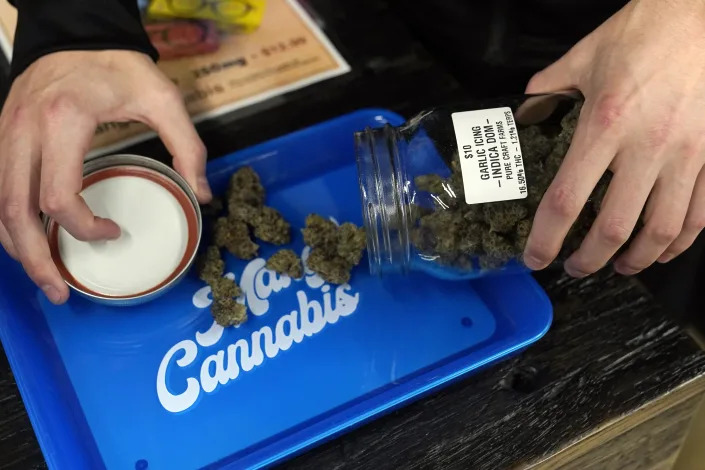

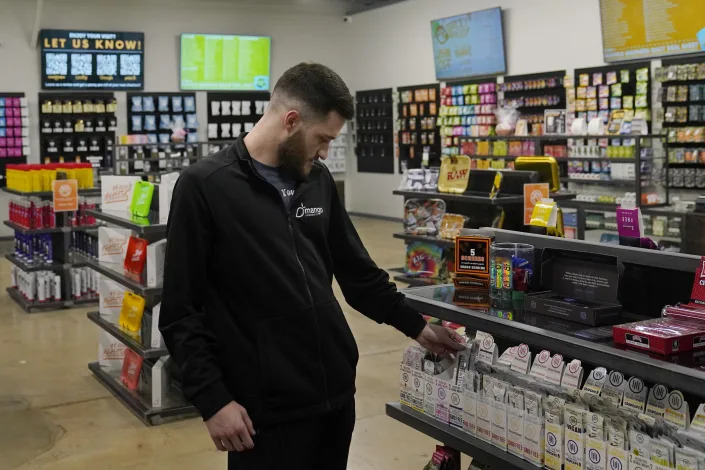
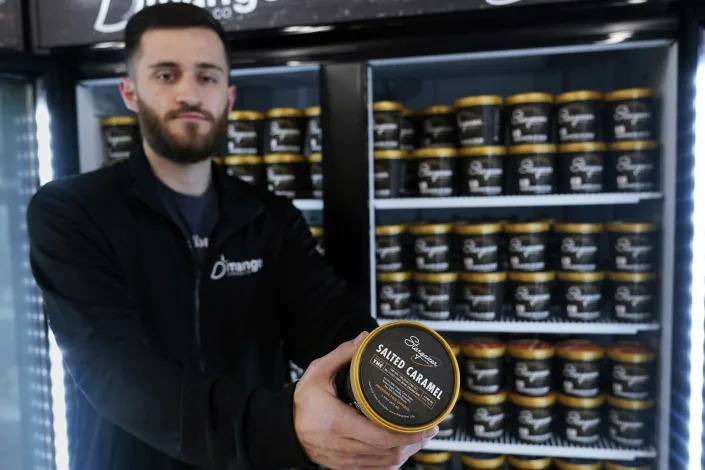
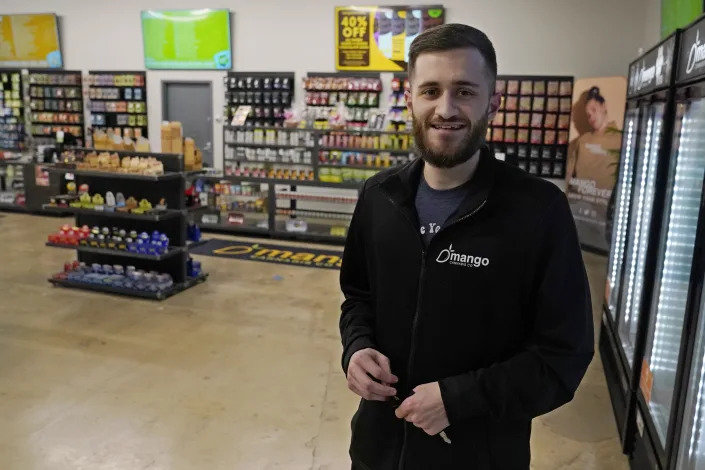
Oklahoma Marijuana Store manager Josh Poole is pictured in a Mango Cannabis medical marijuana dispensary, Monday, March 6, 2023, in Oklahoma City.
ASSOCIATED PRESS
March 7, 2023
OKLAHOMA CITY (AP) — Oklahoma voters on Tuesday rejected the legalization of recreational marijuana, following a late blitz of opposition from faith leaders, law enforcement and prosecutors.
Oklahoma would have become the 22nd state to legalize adult use of cannabis and join conservative states like Montana and Missouri that have approved similar proposals in recent years. Many conservative states have also rejected the idea, including Arkansas, North Dakota and South Dakota last year.
Republican Gov. Kevin Stitt and many of the state’s GOP legislators, including nearly every Republican senator, opposed the idea. Former Republican Gov. Frank Keating, an ex-FBI agent, and Terri White, the former head of the Oklahoma Department of Mental Health and Substance Abuse Services, led the "no" campaign.
“We’re pleased the voters have spoken," said Pat McFerron, a Republican political strategist who ran the opposition campaign. "We think this sends a clear signal that voters are not happy with the recreational nature of our medicinal system. We also think it shows voters recognize the criminal aspects, as well as the need for addressing mental health needs of the state.”
Oklahoma voters already approved medical marijuana in 2018 by 14 percentage points and the state has one of the most liberal programs in the country, with more than 2,800 licensed dispensaries and roughly 10% of the state’s adult population having a medical license to buy and consume cannabis.
On Tuesday's legalization question, the “no” side was outspent more than 20-to-1, with supporters of the initiative spending more than $4.9 million, compared to about $219,000 against, last-minute campaign finance reports show.
State Question 820, the result of a signature gathering drive last year, was the only item on the statewide ballot, and early results showed heavy opposition in rural areas.
“Oklahoma is a law and order state," Stitt said in a statement after Tuesday's vote. "I remain committed to protecting Oklahomans and my administration will continue to hold bad actors accountable and crack down on illegal marijuana operations in our state.”
The proposal, if passed, would have allowed anyone over the age of 21 to purchase and possess up to 1 ounce of marijuana, plus concentrates and marijuana-infused products. Recreational sales would have been subjected to a 15% excise tax on top of the standard sales tax. The excise tax would be used to help fund local municipalities, the court system, public schools, substance abuse treatment and the state’s general revenue fund.
The prospect of having more Oklahomans smoking anything, including marijuana, didn't sit well with Mark Grossman, an attorney who voted against the proposal Tuesday at the Crown Heights Christian Church in Oklahoma City.
“I was a no vote because I'm against smoking,” Grossman said. “Tobacco smoking was a huge problem for my family.”
The low barriers for entry into Oklahoma's medical marijuana industry has led to a flood of growers, processors and dispensary operators competing for a limited number of customers. Supporters had hoped the state's marijuana industry would be buoyed by a rush of out-of-state customers, particularly from Texas, which has close to 8 million people in the Dallas-Fort Worth area just a little more than an hour drive from the Oklahoma border.
Michelle Tilley, campaign director for Yes on 820, said despite Tuesday's result, full marijuana legalization was inevitable. She noted that almost 400,000 Oklahomans already use marijuana legally and “many thousands more” use it illegally.
“A two-tiered system, where one group of Oklahomans is free to use this product and the other is treated like criminals does not make logical sense,” she said in a statement.
Oklahoma Voters Overwhelmingly Reject Effort To Legalize Recreational Marijuana
Jonathan Nicholson
Tue, March 7, 2023
Oklahoma voters sharply rejected a ballot initiative to legalize recreational marijuana Tuesday, a defeat that came almost five years after voters had easily approved the legalization of medical marijuana.
With almost all precincts having reported, the vote on State Question 820 was 62% opposed and 38% in favor.
“We think this sends a clear message that Oklahomans oppose the unfettered access to marijuana we have experienced under our so-called medical program. Voters clearly want to protect our children, crack down on organized crime and improve the mental health of those in our state,” said Pat McFerron, a spokesperson and pollster for Protect Our Kids No 820.
The campaign was a relatively low-key affair, though, as the vote was pushed back from the November 2022 date marijuana proponents had been hoping for to March, where the initiative was the sole item to be voted on in many places.
Supporters of legalized recreational marijuana saw that placement as one of the main obstacles to its approval.
“With a March special election and no other issues on the ballot, we knew from the beginning this would be an uphill battle,” said Brian Vicente, a lawyer and a steering committee member for the pro-legalization group Yes on 820.
Michelle Tilley, the group’s campaign director, said it was only a matter of time before Oklahoma joined 21 other states in approving marijuana for recreational use.
With a March special election and no other issues on the ballot, we knew from the beginning this would be an uphill battle.Brian Vicente, steering commitee member for the Yes on 820 pro-legalization group
“There are almost 400,000 Oklahomans ― that’s almost 10% of our population ― using marijuana legally; there are many thousands more using marijuana acquired off the illicit market,” she said.
“A two-tiered system, where one group of Oklahomans is free to use this product and the other is treated like criminals does not make logical sense.”
Proponents touted the prospect of additional tax revenue for the state from expanding the marijuana market and the fairness of allowing people with minor convictions in marijuana cases to have them expunged.
Opponents, led by former Republican Gov. Frank Keating, a onetime FBI agent, pointed to problems with the existing medical marijuana regime as well as fears that legalizing recreational marijuana would bring more crime and environmental problems.
Legalization advocates held a decisive edge in cash for the campaign, raising $3.2 million through the end of 2022 and airing broadcast TV commercials in the closing weeks. The anti-legalization side, according to its pollster Pat McFerron, was expected to spend only about $250,0000 and concentrate on satellite and cable TV ads.
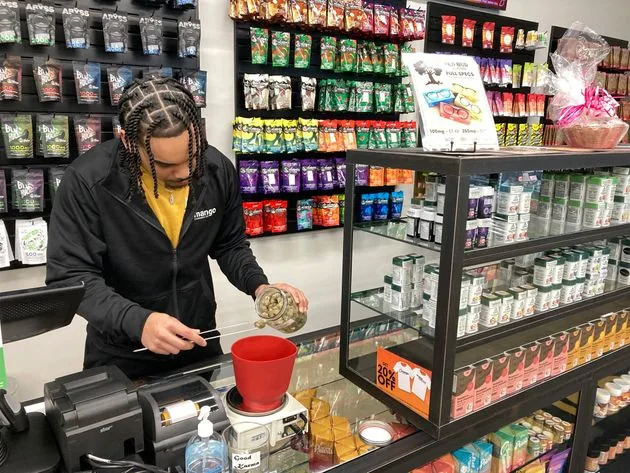
Ethan McKee, vice president of Mango Cannabis, weighs marijuana flowers at an Oklahoma City dispensary on Feb. 28.
Ethan McKee, vice president of Mango Cannabis, weighs marijuana flowers at an Oklahoma City dispensary on Feb. 28.
But the backdrop was in many ways unfavorable to marijuana advocates. In November, four Chinese nationals were found shot to death at a farm in rural Kingfisher County in a crime that made headlines statewide and that law enforcement officials said showed the potential pitfalls of a larger cannabis industry.
In addition, there had been growing and bipartisan consensus that regulation of medical marijuana, which was approved in a similar statewide vote by a 57% to 43% margin in 2018, had not kept up with the industry’s explosive growth. Oklahoma has nearly three times as many licensed cannabis dispensaries and almost as many licensed grow facilities as California, despite the latter having 10 times Oklahoma’s population and having already legalized recreational marijuana years ago.
Gentner Drummond, Oklahoma’s Republican attorney general praised the vote Tuesday, saying, “Regardless of where one stands on the question of marijuana legalization, the stark reality is that organized crime from China and Mexico has infiltrated Oklahoma’s medical marijuana industry.”
The recreational marijuana measure voted on Tuesday would have allowed sales to residents 21and older and taxed them at 15%. Proceeds from the taxes would have been split among schools, drug treatment programs and state and local governments. It also would have allowed for the expungement of minor marijuana-related criminal convictions.
According to the pro-legalization advocates, about 4,500 Oklahomans are arrested annually over small amounts of marijuana. Ryan Kiesel, a senior adviser to Yes on 820, said expungement of criminal records must still be fought for.
“We have thousands of families being torn apart and thrown into chaos every year because a mom or a dad has a small amount of marijuana that would be legal in 21 other states and legal in Oklahoma for medical card holders,” he said.
Ahead of the vote, Drummond told the Tulsa-based Black Wall Street Times he was willing to look at making expungement easier.
“If it does not pass, I do think in the spirit of criminal justice reform, marijuana possession and consumption should be addressed. And there should be a mechanism considered by the legislature that I’m happy to administer toward the expungement of those things,” he said.
Jonathan Nicholson
Tue, March 7, 2023
Oklahoma voters sharply rejected a ballot initiative to legalize recreational marijuana Tuesday, a defeat that came almost five years after voters had easily approved the legalization of medical marijuana.
With almost all precincts having reported, the vote on State Question 820 was 62% opposed and 38% in favor.
“We think this sends a clear message that Oklahomans oppose the unfettered access to marijuana we have experienced under our so-called medical program. Voters clearly want to protect our children, crack down on organized crime and improve the mental health of those in our state,” said Pat McFerron, a spokesperson and pollster for Protect Our Kids No 820.
The campaign was a relatively low-key affair, though, as the vote was pushed back from the November 2022 date marijuana proponents had been hoping for to March, where the initiative was the sole item to be voted on in many places.
Supporters of legalized recreational marijuana saw that placement as one of the main obstacles to its approval.
“With a March special election and no other issues on the ballot, we knew from the beginning this would be an uphill battle,” said Brian Vicente, a lawyer and a steering committee member for the pro-legalization group Yes on 820.
Michelle Tilley, the group’s campaign director, said it was only a matter of time before Oklahoma joined 21 other states in approving marijuana for recreational use.
With a March special election and no other issues on the ballot, we knew from the beginning this would be an uphill battle.Brian Vicente, steering commitee member for the Yes on 820 pro-legalization group
“There are almost 400,000 Oklahomans ― that’s almost 10% of our population ― using marijuana legally; there are many thousands more using marijuana acquired off the illicit market,” she said.
“A two-tiered system, where one group of Oklahomans is free to use this product and the other is treated like criminals does not make logical sense.”
Proponents touted the prospect of additional tax revenue for the state from expanding the marijuana market and the fairness of allowing people with minor convictions in marijuana cases to have them expunged.
Opponents, led by former Republican Gov. Frank Keating, a onetime FBI agent, pointed to problems with the existing medical marijuana regime as well as fears that legalizing recreational marijuana would bring more crime and environmental problems.
Legalization advocates held a decisive edge in cash for the campaign, raising $3.2 million through the end of 2022 and airing broadcast TV commercials in the closing weeks. The anti-legalization side, according to its pollster Pat McFerron, was expected to spend only about $250,0000 and concentrate on satellite and cable TV ads.

Ethan McKee, vice president of Mango Cannabis, weighs marijuana flowers at an Oklahoma City dispensary on Feb. 28.
Ethan McKee, vice president of Mango Cannabis, weighs marijuana flowers at an Oklahoma City dispensary on Feb. 28.
But the backdrop was in many ways unfavorable to marijuana advocates. In November, four Chinese nationals were found shot to death at a farm in rural Kingfisher County in a crime that made headlines statewide and that law enforcement officials said showed the potential pitfalls of a larger cannabis industry.
In addition, there had been growing and bipartisan consensus that regulation of medical marijuana, which was approved in a similar statewide vote by a 57% to 43% margin in 2018, had not kept up with the industry’s explosive growth. Oklahoma has nearly three times as many licensed cannabis dispensaries and almost as many licensed grow facilities as California, despite the latter having 10 times Oklahoma’s population and having already legalized recreational marijuana years ago.
Gentner Drummond, Oklahoma’s Republican attorney general praised the vote Tuesday, saying, “Regardless of where one stands on the question of marijuana legalization, the stark reality is that organized crime from China and Mexico has infiltrated Oklahoma’s medical marijuana industry.”
The recreational marijuana measure voted on Tuesday would have allowed sales to residents 21and older and taxed them at 15%. Proceeds from the taxes would have been split among schools, drug treatment programs and state and local governments. It also would have allowed for the expungement of minor marijuana-related criminal convictions.
According to the pro-legalization advocates, about 4,500 Oklahomans are arrested annually over small amounts of marijuana. Ryan Kiesel, a senior adviser to Yes on 820, said expungement of criminal records must still be fought for.
“We have thousands of families being torn apart and thrown into chaos every year because a mom or a dad has a small amount of marijuana that would be legal in 21 other states and legal in Oklahoma for medical card holders,” he said.
Ahead of the vote, Drummond told the Tulsa-based Black Wall Street Times he was willing to look at making expungement easier.
“If it does not pass, I do think in the spirit of criminal justice reform, marijuana possession and consumption should be addressed. And there should be a mechanism considered by the legislature that I’m happy to administer toward the expungement of those things,” he said.
No comments:
Post a Comment